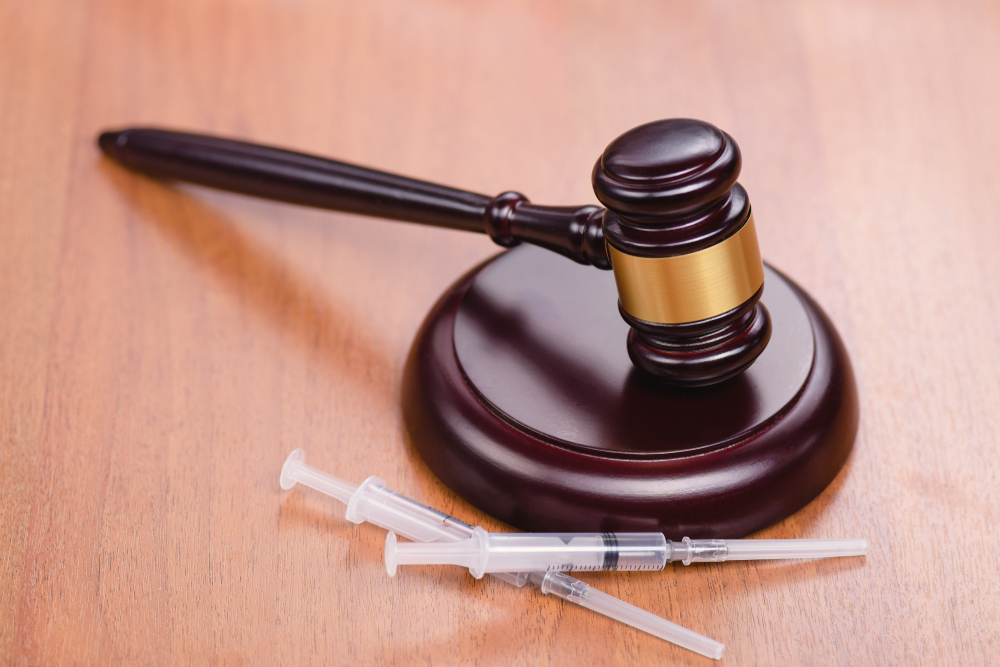Agriculture supports about 1 in 10 jobs in Pennsylvania, and makes up more than $125 billion in total economic output. The commonwealth’s rich farming tradition continues to this day, which is one big reason why so many people in Pennsylvania are concerned about their exposure to the potentially dangerous herbicide, “Roundup.”
Many people in Pennsylvania are taking action over Roundup, which is also known by the name of its active ingredient, glyphosate. Some in the commonwealth are among the 100,000-plus people who have filed class-action lawsuits over Roundup, while lawmakers in Philadelphia are among the dozens across the country to have banned glyphosate and similar weedkillers in public spaces.
What should residents of Pennsylvania know about how much glyphosate has been used in the commonwealth, what negative health effects Roundup can have, and what their legal rights may be to seek compensation if they or a loved one used Roundup and became ill?
What Does Roundup Do?
Glyphosate was first patented for use as an herbicide by the Monsanto Corp. in 1974. For decades before that, glyphosate had been used as a de-scaling agent in the commercial plumbing industry.
Shortly after Monsanto, which is the company that invented other controversial products like saccharine and DDT, introduced glyphosate to the market as Roundup. The product became intensely popular, and it remains the most commercially successful herbicide ever.
Roundup’s effectiveness can be traced to the way in which it attacks plants. Glyphosate stops an organic process plants need to continue growing by stopping production of a specific enzyme. This enzyme does not exist in humans or household pets, which is one reason why Monsanto and its parent company, Bayer, have said their product cannot be dangerous to people or animals.
It is difficult to quantify exactly how much Roundup has been used in Pennsylvania since the product was introduced in 1974, since there are several versions available, considering agricultural, commercial, and residential purposes. However, one study suggests that more than 3.5 billion pounds of glyphosate have been used in the U.S.
Similarly, it is possible to estimate glyphosate use in agriculture by analyzing data published by the U.S. Geological Survey (USGS). This data indicates that since 1992, nearly 32 million pounds of glyphosate have been applied to farm fields, orchards, and other agriculture in Pennsylvania since 1992.
Glyphosate Use in Pennsylvania
Let’s take a closer look at farming and glyphosate in Pennsylvania:
- Since 1992, nearly 32 million pounds of glyphosate have been applied to Pennsylvania farm fields.
- In 2017, the most recent year with available data, Pennsylvania ranked 27th among all states in terms of use, with about 2.2 million pounds of glyphosate used in agriculture.
- Glyphosate is the most common herbicide or pesticide used in Pennsylvania farming —used at more than double the rate of its closest competitor.
- Corn (56%) and soybeans (41%) accounted for almost all the glyphosate used in the state in 2017.
- Pennsylvania ranks No. 15 nationwide for the production of corn, with 152 million bushels in 2020, and No. 19 for soybeans, with almost 30 million bushels.
- Nearly 600,000 jobs in the commonwealth are connected to farming.
Is Roundup Dangerous?
The widespread use of Roundup is especially concerning because of increasing evidence that suggests it’s far from safe. In fact, in addition to jury verdicts that have confirmed this connection, academic research, regulation, and legislation all have indicated that Roundup may be too dangerous for use.
Here’s a summary of evidence that suggests Roundup is dangerous, including right here in Pennsylvania:
- Philadelphia City Council members in December 2020 voted unanimously to ban the use of glyphosate on public grounds, including parks, playgrounds, and other taxpayer-funded spaces. The ban will be phased in over three years, and the measure requires the city’s parks department to make a public report about all pesticide use.
- By the end of 2021, New York is poised to become the first state to ban glyphosate on state-owned property thanks to a bill signed into law in the summer of 2020.
- Several communities in California have said glyphosate cannot be used, and the California Office of Environmental Health Hazard Assessment formally lists glyphosate as a probable human carcinogen.
- The International Agency for Cancer Risk began listing glyphosate as a probable carcinogen in 2015.
- Luxembourg, Mexico, Thailand, and Vietnam have banned glyphosate, and Germany is considering phasing out agricultural usage of the chemical.
- Between 1985 and 1991, the U.S. Environmental Protection Agency (EPA) listed glyphosate as a probable carcinogen before reversing course and determining the substance likely does not cause cancer.
- More than 100,000 cases have been filed, alleging that Roundup causes cancer, particularly non-Hodgkin lymphoma. All three of the cases that have gone to trial so far have resulted in multimillion-dollar awards for plaintiffs, even after appeals.
- Bayer and Monsanto have proposed as much as $12 billion to settle current and future cases.
- A study published by the University of Washington determined that glyphosate exposure increases cancer risk by as much as 41%.
Roundup and Non-Hodgkin Lymphoma (NHL)
All three verdicts so far have involved plaintiffs diagnosed with non-Hodgkin lymphoma, and the $12 billion in possible settlement money is aimed at patients with this type of cancer.
For Pennsylvania residents who might be concerned about their cancer risk, what physical signs should they look for? Symptoms vary by person, but here are the most common non-Hodgkin lymphoma indicators:
- Chest pain
- Cough
- Chills
- Easy bruising
- Fatigue
- Fever
- Frequent, severe infections
- Night sweats
- Shortness of breath
- Swollen abdomen
- Swollen lymph nodes
- Weight loss
Non-Hodgkin lymphoma (NHL) is a relatively unusual cancer, though it’s not exceedingly rare. In fact, according to data from the American Cancer Society, NHL accounts for about 4% of cancer cases, and about 82,000 people will be newly diagnosed in the U.S. this year. Tragically, about 21,000 people will lose their lives to the cancer.
However, with early detection, about 73% of people are expected to live at least five years after being diagnosed. That rate falls to 57% if the cancer is not detected until after it’s spread throughout the body.
If you show any of the above symptoms and believe that you may have developed NHL as a result of exposure to Roundup, you should immediately seek medical treatment.
What Is the Current Status of Roundup Litigation?
The first Roundup cancer case that proceeded to trial ended in a verdict that stunned the world. A former California school groundskeeper was awarded a nearly $300 million verdict by jury members who agreed that not only had Roundup exposure caused his cancer, but that Monsanto had concealed the risks of the product from the public.
This case was the first of three consecutive defeats Monsanto and Bayer suffered, with total awards surging to more than $2 billion. Sums were reduced on appeal, but with more than 100,000 similar cases looming, Bayer in 2020 decided to propose a settlement that would end most of the non-Hodgkin lymphoma cases. This $10 million settlement remains under negotiation, as does the $2 billion the company has proposed to set aside for future compensation.
Labelling Settlement
A separate class-action settlement has already been approved in a case in which the company’s product labeling was alleged to be misleading. Wording on Roundup’s label suggests that the lack of the plant enzyme in humans and pets means that it cannot be dangerous to them. According to the class-action settlement totaling about $40 million, Pennsylvania residents who purchased Roundup after Feb. 13, 2013, can receive as much as $90 in compensation if the product’s label caused them to purchase it when they otherwise wouldn’t have.
How Much Can I Get From a Roundup Lawsuit in Pennsylvania?
Settlement offers Bayer has made remain in the negotiation phase, and all three major verdicts remain under appeal by the company. For those reasons, it is tough to project how much a person could expect to receive from a Roundup lawsuit in Pennsylvania.
However, the $10 billion settlement offer also came with a proposed structure for figuring out what each victim would receive under the agreement, so we can look to this to determine which victims under this settlement or the $2 billion future settlement would receive the highest compensation.
- All victims must be U.S. citizens diagnosed with non-Hodgkin lymphoma.
- Victims must have used Roundup for at least a year before they were diagnosed.
- Age at diagnosis will be a factor in increasing awards.
- Survivors of victims who have died are eligible.
- Survivors of those with spouses or juvenile children at their time of death will receive the highest award amounts.
What Should I Do if I Have Been Affected by Roundup?
For health and safety reasons, if you are a Pennsylvania resident who uses Roundup or glyphosate for any reason, including for your job in farming, landscaping, or groundskeeping, you should stop using the product.
Consider consulting with your physician, particularly if you have had multiple symptoms among those listed above.
For those who used Roundup or glyphosate and later were diagnosed with cancer, you may be eligible to receive financial compensation by filing a Roundup lawsuit in Pennsylvania. To determine the wisest course of action, you should consult with an expert Roundup class-action law firm in Pennsylvania. We can help connect you with a reputable firm in your area.
In most cases, you won’t pay legal fees unless you win your case, and most consultations are free.





